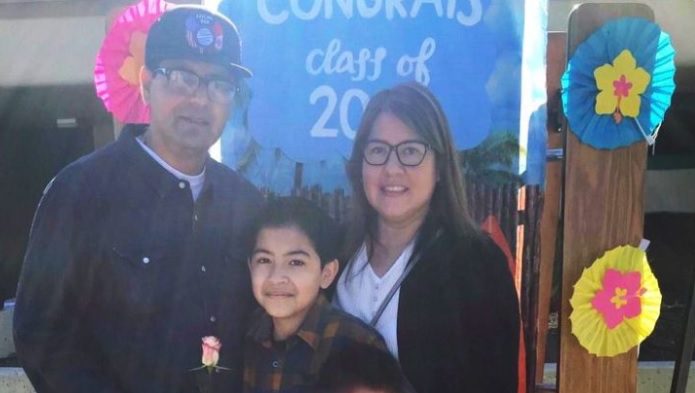In the wake of the suicide of a worker who survived the mass shooting in May, VTA’s biggest employee union is laying blame at the feet of the agency.
The transit agency confirmed Tuesday that Henry Gonzales, a veteran paint and body worker at VTA’s Guadalupe Light Rail Yard, died in an apparent suicide. He served as an executive board member of the Amalgamated Transit Union Local 265. He was a husband and father of four children.
Just hours after Gonzales’ death was confirmed, ATU International president John Costa blasted the agency for failing to provide mental health support to workers.
“Unfortunately, the VTA has taken no action to address the grief, the mental health, and the safety of their employees who have been under unfathomable extreme stress after this tragic shooting,” Costa said. “The VTA’s inaction is shameful and threatens the well-being of our Local 265 members. VTA workers must have immediate access to the full spectrum of mental health services, including in-patient care. They must also have access without having to get through the thicket of bureaucratic hurdles that currently restrict access to needed care.”


Transit leaders fired back by saying the agency reached out to employees and their families daily with counseling and trauma resources, in addition to unlimited time off to grieve. Those who felt they could not return to the site of the shooting were offered alternative options.
The agency also called on union leaders to stop the “false accusations.”
“The health and well-being of our employees remain the priority at VTA any accusation that it is anything less, is wholly unfounded,” officials said in a statement. “We ask that our union partners respect what has been accomplished together, as difficult as each step has been, and that we continue to focus on healing, rather than finding opportunities to place blame.”
A GoFundMe page created by Gonzales’ brother-in-law, Julio Calderon, says Gonzales was near the shooter who killed nine of Gonzales’ colleagues on May 26. Calderon wrote that Monday was Gonzales’ first day back at the VTA yard.
“It deeply saddens us to know, Henry suffered silently with PTSD, depression and felt he could no longer bare the pain,” Calderon wrote. “I only wish that we could all have a bit of compassion for those who silently suffer from depression.”
Calderon told San José Spotlight that his family is very thankful for the outreach from the community.
“We are taking it one day at a time,” he said. He requested that people keep his family in their prayers and donate to his sister’s GoFundMe.
Gonzales’ death exposed the growing tension between VTA and ATU, which has been increasingly critical of the agency’s treatment of workers following the shooting. The union also butted heads with management in the months leading up to the shooting, including over COVID-19 safety measures and a shriveling budget.
John Courtney, president of ATU Local 265, told San José Spotlight that VTA has not offered adequate resources to members battling depression, anxiety and PTSD following the shooting, and specifically criticized the agency’s health care provider, Kaiser, as being “horrible” for psychiatric treatment. He noted that he was in therapy for PTSD, and that employees need more support from VTA.
“It’s the same old Employee Assistance Program,” Courtney said, referring to a service at VTA that offers counseling visits for workers. “This is not a normal grief counseling situation.”
A VTA spokesperson told San José Spotlight they could not address whether Gonzales participated in counseling, as that is a private matter VTA does not have access to. They added that VTA continues to reach out on a daily basis to let employees know what resources are available, but the agency cannot force people to participate in mental health services.
“However, as part of the phased in reboarding process in preparation to return to work, employees must participate in a mandatory trauma recovery training session, and are provided access to one on one counseling if they choose to pursue it,” the spokesperson said. They added that employees going through the “return to work process” are given a tour of work areas, either at the Guadalupe rail yard or at temporary work sites, after which they’re given the choice to return to work, be reassigned in the agency or work with human resources staff on other alternatives.
The spokesperson said Costa’s assertion that VTA has done nothing to provide mental health and trauma resources to employees is factually incorrect.
VTA workers who spoke with San José Spotlight say the agency is exaggerating some of its claims about the support it is offering workers.
“I have not been contacted on a daily basis so that is not true,” one worker said. They said the agency has encouraged employees to offer support to co-workers. They added that many workers don’t want to return to the rail yard—and some may never want to come back.
ATU members with mental health concerns can contact the union’s partner, FHE Health: 1-866-276-1610. VTA also offers EAP counseling sessions to its employees. Employees can contact the agency to learn about other services.
Contact Eli Wolfe at [email protected] or @EliWolfe4 on Twitter.



Leave a Reply
You must be logged in to post a comment.